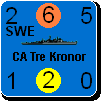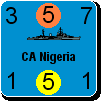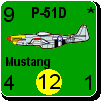composer99
Posts: 2923
Joined: 6/6/2005
From: Ottawa, Canada
Status: offline

|
I haven't played any comparable global-scale wargames, so I can't make any comparative remarks - I don't know what sets WiF apart from other games.
But I can say what I do find to be superior or inferior about the game. Apologies if this is redundant with other comments.
Superior Aspects of WiF
- The various subsystems, while effectively modular, interact cleanly. Land, air & naval operations are essentially different modules, but each interacts well with the other two (with exceptions I will note below). Layered above these operatonal subsystems are subsystems for politics, US entry, turn length & weather, initiative, production, logistics, and (if you play with the appropriate optional rule) intelligence, all of which interact well with the operational subsystems which are the heart of the game (although some subsystems could be better IMO - to be noted below). Even better, each subsystem has its own unique feel, which prevents the game from becoming stale.
- The counter mix for each nation's force pools, and the variability within the mix, as well as the initial setup and terrain & resource placement, give a historical feel (and impose historical constraints) to the game without forcing the players to play the historical war. Beginning a 1939 game as, say, the Commonwealth (UK + Dominions + Empire), you feel like you are facing the strategic challenges the CW did, and your response to those challenges, even if not done exactly the way the CW did historically, will be consistent with the capabilities the CW had. And so it goes for the other major powers.
- The mixture of required die roll results (rolling high for initiative, naval damage & land combat good, rolling low for naval searches good, rolling extremes (both high & low) for air combat good) and other randomization (you must randomly choose units from your force pool when building units, so you can't guarantee you'll get the best stuff all the time) and the sheer number of die rolls involved tends to mitigate the effects of critical luck (although not eliminate it entirely). So within a turn you will see lots of good and bad outcomes depending on your planning & skill and the die roll result, but usually unless a sequence of key die rolls comes up strongly one-sided the die rolls won't overpower the planning & skill in deciding the game.
- Despite the depth of the rules and the operational opportunities that emerge from them, WiF plays like a 'beer & pretzel' game. Even though the rulebook is much larger, I feel like it is as easy to learn to play WiF as it is to learn to play the old AH game The Russian Campaign. And at any rate it is certainly fun.
- The breadth of optional rules allow for a wide variety of games. If you prefer simplicity, WiF Classic (without Shipes in Flames or Planes in Flames) is the way to go; if you like more depth and complexity, the optional rules let you have it.
The things I'm not so fond of in WiF are:
- The naval seabox/sea area subsystem has glitches at its points of interaction with other subsystems, at least IMO, mainly dealing with the interaction of naval units with coastal hexes (for shore bombardment & invasion) and the ability of low-range aircraft to dominate sea areas.
- The political system feels incomplete in out-of-the-box WiF. I've played a few Days of Decision games and while I like the concept, I think the implementation is a bit kludgy. I have yet to try Politics in Flames so I couldn't say anything about it.
- Logistics in WiF are a bit too binary and are implemented too simply, at least IMO (although I do realize that wargamers, myself included, do not like playing logistics games. We like playing wargames). The way the system currently works, one convoy point can maintain supply for the entire Allied Expeditionary Force in France in 1944, or the entire Japanese Army in mainland Asia (or not even that if you're not playing with the Limited Overseas Supply optional rule). On the other hand, units that are out-of-supply for even the shortest amount of time are almost completely impotent. Oil rules remediate this to some extent.
_____________________________
~ Composer99
|
 Printable Version
Printable Version











 at the feet of Steve!
at the feet of Steve!
 New Messages
New Messages No New Messages
No New Messages Hot Topic w/ New Messages
Hot Topic w/ New Messages Hot Topic w/o New Messages
Hot Topic w/o New Messages Locked w/ New Messages
Locked w/ New Messages Locked w/o New Messages
Locked w/o New Messages Post New Thread
Post New Thread